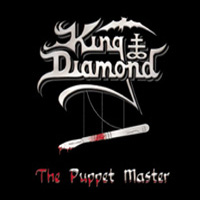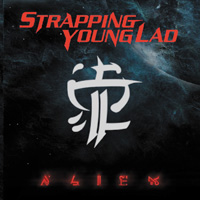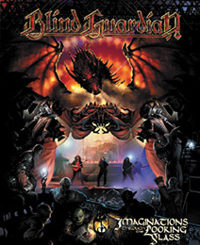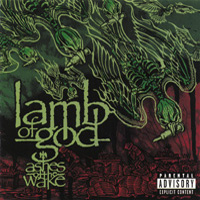 Lamb of God
Lamb of God
Ashes of the Wake (Epic)
An interview with drummer Chris Adler
by Martin Popoff
photos by Carina Mastrocola
Virginia’s Lamb of God are now onto their third sledge o’ metal under that benign name (a tour with Wolf is not in the cards), and alas, Ashes of the Wake is on a major label, despite its no compromise, Slayer-esque, progressively calculated, slide-rule thrash, the album topped with a vocalist in Randy Blythe who is one of the most goat’s milk-curdling throat terrorists in new American metal today. Yes, indeed, mutton’s going to stop ’em, as Lamb chop their way through what is a grueling, mercenary, par-for-the-course tour schedule for this sincere, hard working, tight-knit 10 year collective. Drummer Chris Adler is one of them drummer/leaders, and Lollipop had the pleasure recently to jaw with Adler about the band’s stellar new clatter platter, about the state of the world, and about something more pressing to national security in the here and now, the state of the metal nation.
What are the differences with this new album, Ashes of the Wake, versus the last two, New American Gospel and As The Palaces Burn?
It’s definitely the first time we walked away from a project and everybody had no inclination to spend any more time on it. No one was disappointed in any way. No more money or amount of knob-turning would’ve made it any better. We felt a little more confident in ourselves as players, and it turned into a stronger record. We were able to relax and trust ourselves as players and as a band, and not necessarily push as hard some idea that somebody had.
Do you think history will remember the last record as the stranger record, a lot of diverse stuff going on, your “woodshed of riffs” record?
If history remembers us at all (laughs), I’d be surprised and flattered. As the Palaces… was kind of our classic speed metal record. It was stripped-down, not a lot of production value, raw, garage band, very tight kind of thing. I think of the current record as “spreading our wings,” trying different ideas, making production choices we weren’t able to make previously and spending more time on the idea of the song, as opposed to the parts of the songs.
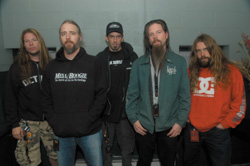 I hear that this was a stressful record, that it had to be written and recorded quickly.
I hear that this was a stressful record, that it had to be written and recorded quickly.
Well, we signed the deal with Epic towards the end of 2003, and at the time, As the Palaces… was still pretty fresh, still selling well, and we were having great shows. A normal touring cycle for any album is 12 to 18 months, and we were at about the eight-month point when we signed with Epic. They turned around and said they wanted a record right away. I don’t blame them; they need a product to sell. But for us, we’d already signed up for the Headbangers Ball Tour, which was going to take us through November and December, and they were talking about a May 31st deadline for this record. As you know, you have your whole life to write your first record, and then maybe two or three years to write the next one, and then maybe a year and a half to write the next one, and if things go well, it gets shorter and shorter. So it was very intimidating, to think we had January, February, March, and April to write, then get into the studio for a month and try to record this thing. That was certainly the smallest amount of time we’d ever been given.
We went at it in the practice space, and we spent six to 10 hours a day hashing things out, throwing things out the window, bringing them back in, whatever it took, and by the time the deadline came around, we had 12 or 13 songs that everybody felt great about. With New American Gospel, we had a week left before going into the studio, and we had nine songs. We really wanted it to be a 10-song record, so during that week we wrote “Black Label,” the song that most people latched onto. On As the Palaces…, we had a week left, I think we had eight songs, and we really wanted a 10-song record again, so in a week, we wrote both “Ruin” and “11th Hour.” I think when we’re under the gun, our best foot jumps forward. So it was kind of like being under the gun for that whole time.
How did the recent polarization of politics in America affect the band?
No two guys believe the same things in this band. We go over the lyrics with Randy, and it’s important for everybody to put their stamp of approval on everything. In what Randy is saying, there’s no “Vote for George Bush, vote for John Kerry, vote for Ralph Nader.” The idea was to bring up things to get different points across to help people think for themselves and make their own decisions. But we have our opinions as well. The point was to bring things up and tell people to dig in a little harder and think for themselves.
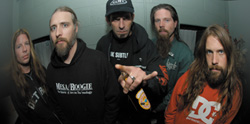 Were you guys angry to see Bush win?
Were you guys angry to see Bush win?
That’s a difficult question to answer. If I tell you we were disappointed, which is the case, it makes us seem as though we were Kerry supporters, which was never our idea. I don’t think anybody, including ourselves, want us to start telling people how to vote. When you put a bumper sticker on your truck for a candidate, you’re basically doing a similar thing that we are. This band just happens to be our vehicle. If I see you with a Bush sticker on your car, I’m not going to run you off the road, I’m not going to give you a hard time, that’s your opinion and you’re welcome to it.
This album title: Why Ashes of the Wake?
The world in general, especially this country, is in a race to self-destruct. Ashes of the Wake is kind of the pessimistic view, the idea of “what are we going to leave behind once we win that race? Will it be any better?” Doubtful.
What did Machine do as a producer that was interesting or surprising?
There are so many great metal producers right now doing great work. I mean, all the new metal records coming out have the good producers, the usual suspects, and sound amazing. Very nice, tight, clean, shimmery: They’re everything you want them to be. We know who these guys are, and they were on the list of people we thought we should probably talk to. But at the same time, you know, in using Devin on As the Palaces…, we felt like, he’s certainly one of the best of the best, but why don’t we really branch out for a minute? Not that we want to have a record that doesn’t sound like a good metal record, but there’ve got to be guys who’re doing things outside of this arena who can add something to what’s already happening in metal. In researching these guys, Machine kept coming up, over and over. He’d done King Crimson records, so we knew he could handle the prog aspect of the band. He’d done bands in the rave scene, even Prodigy, which gave him an understanding of different sounds, different soundscapes and sound design. So bringing him in, we wanted to be surprised by his input. And that’s exactly what happened. Unlike the metal producer who’d say, “OK, metal band, play the song and I’m going to make it sound like gold.” He was in there saying, “I understand Lamb of God as this; do you guys see it as that? Is that something you’d want to accentuate?”
Any technological specifics that he trotted out?
The guitars were tracked live through an amp, but at the same time, they were run completely clean into another hard disk recorder. So when he went to mix to record, he could re-amp a clean sound on a million different amps or whatever he wanted to find the balance where these two guitars sit well together. Instead of having it sound like there’s only one guitar, there’s a little bit of difference. He brought in a lot of the rave stuff, the big bass drops, and such. A lot of that kind of stuff we had to tell him to slow down on. (laughs)
Bass drops?
At the end of “Laid to Rest” – it’s the intro but it’s also the outro – there’s a subsonic drop. We’re able to replicate that live with different floor toms and whatever. The kind of thing where a kid plays the CD in his car and the speakers blow up.
Any new experiences, given your success, with meeting your heroes?
I’ve run into and’ve had great experiences with guys I really respect, like Richard Christy and Gene Hoglan. To meet them and to kind of become friends with them is a thrill for me. And the quote unquote success we’re having, every day we wake up, we can’t believe it. We know how fickle this industry is, and we know that tomorrow we could go home and play to five people for the rest of our lives. We really try to stay humble and have a good time with it. A lot of bands lose that. When we started out, headlining bands we toured with were kind of fed-up and angry, and they didn’t spend the time they should’ve with the fans. The connection was lost, it’d become just a job. We all know that even if this does become a job, it’s the job we’ve always wanted.
What do you like about Randy’s vocals?
Randy is just about as aggressive a thrash metal vocalist as there is out there right now. I think it complements the music. Thrash metal and metal in general is kind of a choice that musicians make to basically never really get anywhere. It’s not meant for the masses; it’s ugly music for ugly people. Randy’s kind of vocal sits on top of that, to me, in the right way.
What’ve you learned, with all this touring, that’s allowed you to stay sane on the road?
A lot of times, it’s trying to keep from getting sick. That’s the worst. I really don’t feel well enough to play, but I know these people have paid good money, so I’m going to go out there and give it my all. And then I’m even more sick than when I started!
But yeah, phone calls home, working out, finding an Internet connection to find out what’s going on in the world… A lot of guys play video games all day, which is what they do at home anyway, so that makes them feel like they’re at home. (laughs) The biggest thing is learning the patience necessary to maintain the friendship. We’ve been a band for 10 years now, and the fun times come and go. The last thing you want to do is be in a band with a guy you want to punch in the face all day long.
When we were in Las Vegas, instead of sitting around the club, everybody looking at each other, waiting for our turn to go on, we ran out and, as a band, we went skydiving. Finding little things to keep that unity, that team mentality, where we feel we’re doing something special, that’s important.
(www.lamb-of-god.com)

